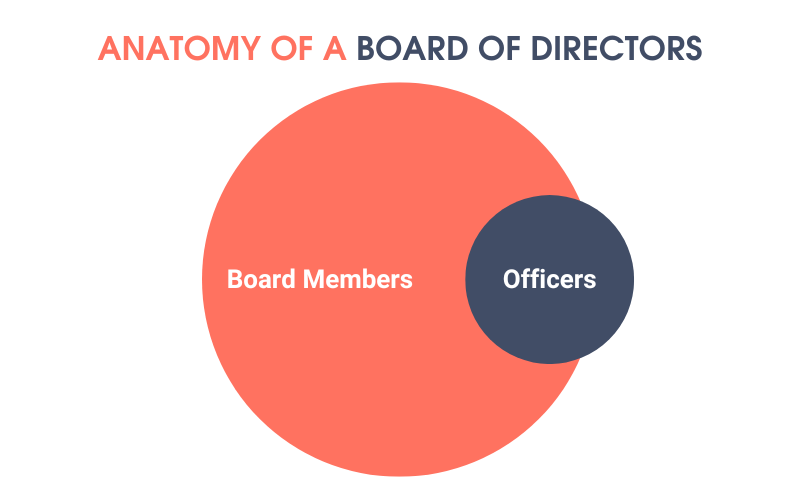
Your nonprofit’s board of directors plays a key role in how your nonprofit is governed. Once you’ve learned the basics about nonprofit boards and feel ready to begin recruiting, it’s time to start considering which board members will also hold offices. All of your board members are considered “directors,” but “officers” on your board hold an additional title to help your board run smoothly
Every nonprofit organization is legally required to have a board to oversee its activities. The IRS generally requires nonprofits to have a minimum of three members. Initial board officers are elected by the board as a whole, and many boards start with three common offices: board chair/president, secretary, and treasurer. Voting procedures and term guidelines for board members and officer roles should be clearly stated in the organization’s bylaws
On the state level, every state requires board officers. That being said, many organizations find that their state has other unique requirements in this area. For example, Indiana requires a minimum of 3 board members, but an individual is permitted to hold more than one officer role. Make sure to play it safe and double check.
In addition to the typical duties of a board member, each officer position has unique responsibilities. We’ve outlined these obligations below so you can set clear expectations for your officers as they help strengthen your board, and by extension, your nonprofit as a whole.
What Does a Board President/Chair Do?
Recommended Skills: Strong Leadership Abilities, Public Facing Communication Experience, Fundraising Savvy
Your board’s president (sometimes called the board chair) is essentially your board’s supervisor. In addition to facilitating board meetings and encouraging other directors to actively participate, the board president is also typically the primary point of contact with executive management, working closest with the CEO or executive director. Sometimes, this person is the CEO or executive director, but keep in mind these roles are separate in function, so this is far more common with startups or very small organizations.
Other main duties may include:
- Leading fundraising efforts, internally and externally
- Welcoming new board members and arranging orientations
- Heading up the executive director’s annual performance evaluation
- If applicable, addressing and sometimes mediating board conflict
- Representing the organization when approached by the media or other groups
What Does a Board Secretary Do?
Recommended Skills: Recordkeeping Experience, High Attention to Detail, Active Listening Skills
The board secretary accurately records and maintains meeting minutes (generally speaking, the play-by-play of what happens during a board meeting). This includes making sure the minutes are archived properly for future reference. Keeping up with each directors’ contact information to inform them about upcoming meetings is also an expectation of the role. A board secretary’s other primary job is to monitor the nonprofit’s activities and board of director’s term lengths to make sure the actions of the organization and the board are following the bylaws. These responsibilities ultimately help the organization avoid liability issues or other common board mistakes.
Other main duties include:
- Coordinating the location and time of the next board meeting and providing notice to attendees
- Distributing board packets that contain the agenda and other materials
- Keeping memberships lists up to date
Note: if you’ll be running your nonprofit’s very first board meeting soon, you’ll want to review our free resource here to learn more about what you’ll want to have prepared. The first board meeting establishes several important items, including appointing officers, selecting the person(s) responsible for opening the organization’s bank account, and other formation details.
What Does a Board Treasurer Do?
Recommended Skills: Fiscal Responsibility, Budgeting Experience, High Level of Integrity
The board treasurer is the officer responsible for the financial wellbeing of the organization. In smaller organizations, it’s not uncommon for the treasurer to manage the nonprofit’s day to day banking, records of receipts, and disbursements. Since all board roles change as the organization gets larger, the treasurer of an older and larger nonprofit may take a high level role such as approving large expenses or leading the committee that creates the nonprofit’s budget. While the treasurer is not required to be an accountant, this person should have experience in keeping track of financials and be the organization’s point of accountability—even if the bookkeeping is outsourced. This person is usually one of the signatories for the nonprofit’s bank accounts when the organization is small or just starting out.
Other duties may include:
- Enforcing financial policies and procedures
- Overseeing the organization’s cash flow
- Advise the board on fiscally responsible strategies/investments
Committees and Other Roles
Many nonprofit board of directors include a vice president position so that they can fill in for the board president/chair if necessary. This officer may also be assigned by the president to carry out certain assignments.
Some boards, if large enough, also separate into committees to oversee different areas of the organization. Board officers may delegate work to the heads of these committees for initiative such as:
- Governance committees to recruit and onboard new directors
- Risk committees to review financial policies and evaluate key liabilities
- Financial committees to go in depth about the organization’s finances and helps the executive director with the annual budget
- Marketing/communication committees to loop in efforts on advertising, media presence, supporter feedback, etc.
- Fundraising committees focused on soliciting grants and donations and planning fundraising events
There may be more possibilities for committees depending on the size and needs of your organization. For example, some committees are temporary to manage a capital campaign or major event. You may find that you’d rather keep your board structure as simple as can be, or you may feel the need to group directors to focus on certain tasks.
There isn’t a right or wrong way to organize your board; the most important goal is ensuring your board is effective in helping your nonprofit accomplish its mission. This could look different depending on the stage of your nonprofit’s lifespan, so be willing to adapt and change to meet the need.
If your board is looking for more tips for nonprofit leaders, consider subscribing to Zac’s monthly newsletter. Zac covers a variety of topics from governance to compliance and you’ll be the first to hear about our latest free resources. And as always, if you’d like to learn more about working with our firm, you can request a consultation here.

